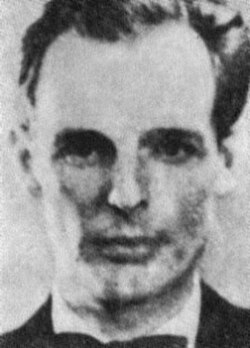Donald Duart Maclean
| Donald Maclean | |
|---|---|
 |
|
| Allegiance | Soviet Union |
| Service | Foreign Office |
| Rank | Counsellor |
|
|
|
| Birth name | Donald Duart Maclean |
| Born |
25 May 1913 Marylebone, London, England |
| Died | 6 March 1983 (aged 69) Moscow, Russian SFSR, Soviet Union |
| Nationality | British |
| Alma mater |
Trinity Hall, Cambridge Gresham's School |
Donald Duart Maclean (/məˈkleɪn/; 25 May 1913 – 6 March 1983) was a British diplomat and member of the Cambridge Five who acted as spies for the Soviet Union.
As an undergraduate, Maclean openly proclaimed his left-wing views, and was recruited into the Russian intelligence service (NKVD). But he gained entry to the Civil Service by claiming to have foresworn Marxism. In 1938 he was made Third Secretary at the Paris embassy, where he kept the Soviets informed about Anglo-German diplomacy. He then served in Washington from 1944 to 1948, achieving promotion to First Secretary. Here he became Moscow's main source of information about US energy policy, greatly helping the Russians to evaluate the relative strength of their own nuclear arsenal.
By the time he was appointed head of the American Department in the Foreign Office, Maclean was widely suspected of being a spy, and the Russians persuaded him to defect in 1951. In Moscow, he worked as a specialist on British policy and relations between the Soviet Union and NATO. He was reported to have died there on March 6, 1983.
Born in Marylebone, London, Donald Duart Maclean was the son of Sir Donald Maclean and Gwendolen Margaret Devitt. His father was chosen as chairman of the rump of the 23 independent MPs who backed Herbert Asquith in the Liberal Party in the House of Commons whilst the bulk of the Liberal MPs had followed David Lloyd George into the Coalition Liberal party in the November 1918 election. As the Labour Party had no leader and Sinn Féin did not attend, he became titular Leader of the Opposition. Maclean's parents had houses in London (later in Buckinghamshire) as well as in the Scottish Borders, where his father represented Peebles and Southern Midlothian, but the family lived mostly in and around London. He grew up in a very political household, in which world affairs were constantly discussed. In 1931 his father entered the Coalition Cabinet as President of the Board of Education.
...
Wikipedia
